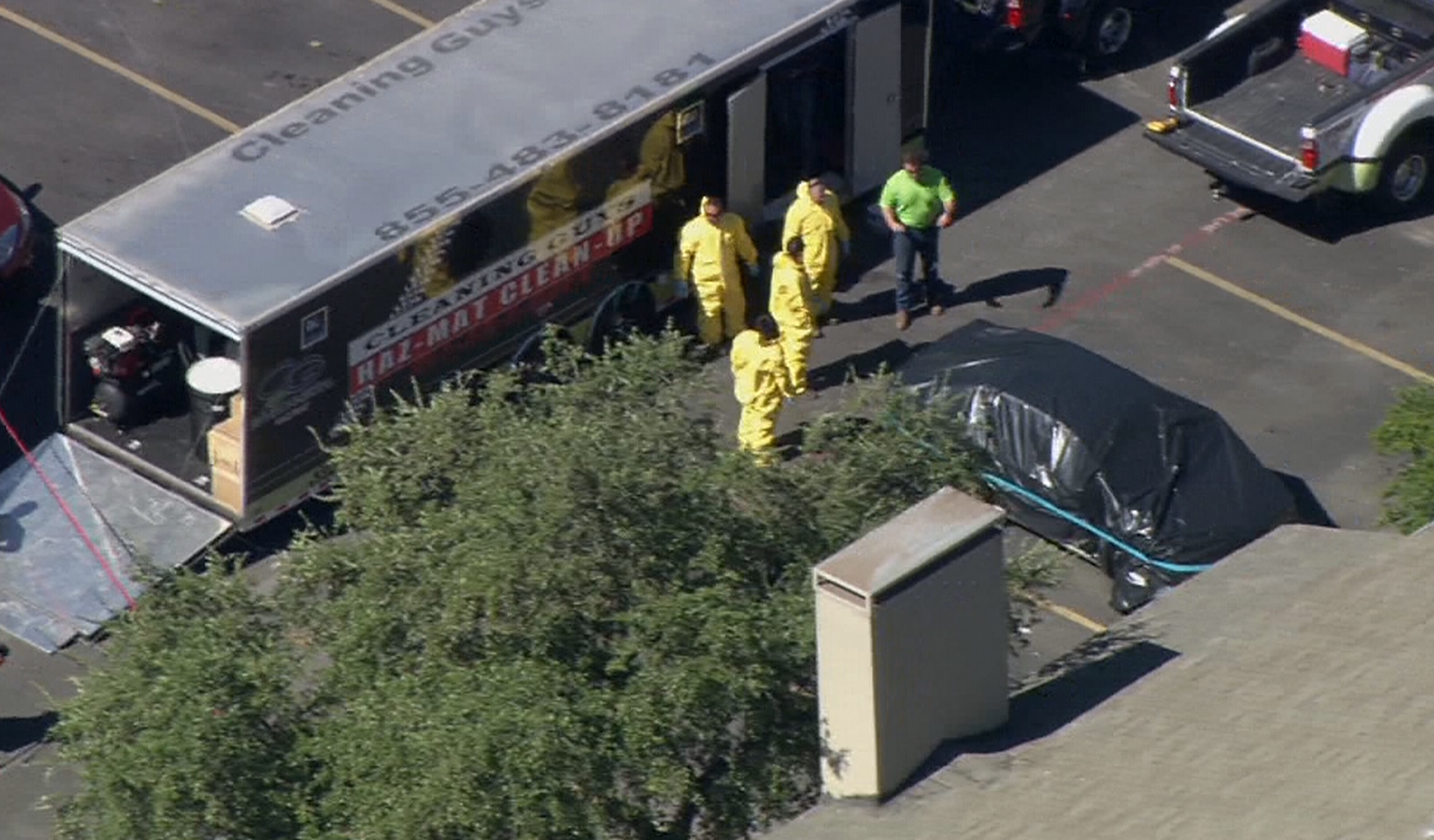![Cleanup at Ivy Apartments [ID=16651577]](http://moc-assets-prod.gannett-cdn.com/-mm-/28798807db7efe6c27a02573c3790acd0bcde37c/r=500x292/local/-/media/WFAA/None/2014/10/03/1412357992000-1003-unitdecontaiminationon.jpg)
DALLAS — Five days after Thomas Eric Duncan was admitted to a Dallas hospital with a suspected case of Ebola, a crew contracted by Dallas County decontaminated the unit where those exposed to the virus continue to live.
Duncan was admitted to Texas Health Presbyterian on September 28 and it was confirmed he was infected with the virus two days later. Those who had contact with Duncan at the apartment were officially ordered to stay within the unit Thursday, two days after the Ebola case was confirmed.
Friday afternoon, however, the city confirmed the family has been relocated from the apartment and moved into a private residence in Dallas County.
A city official told ABC News the private, gated home was donated by a person who would prefer to remain anonymous. City officials had a hard time finding anyone willing to let the family stay in their home because of health concerns.
"The city and county has been working very hard to put this family in a safe location, and it has been tough, because no one wanted them," said city of Dallas spokeswoman Sana Sayed. "And so someone was kind enough to offer up a private residence, that is gated, that is separated from any neighborhood and apartment complex, so that they can have their privacy and be away from anyone who has concerns."
Officials have not disclosed the location of the home where the family of four was moved, other than to say it was in the city of Dallas. The family will remain there as health officials monitor their conditions.
Dallas County Judge Clay Jenkins escorted Duncan's family out of the apartment Friday afternoon personally, while wearing no protective gear in an effort to show the public that the family is healthy and there is no reason for concern.
According to a statement released by Jenkins late Friday morning, the initial cleanup was expected to take about three hours. But after crews got into the apartment Friday, officials now say the complete cleanup will take days.
![Family of Ebola patient moved to new location[ID=15136386] ID=15136386](http://wfaa-download.edgesuite.net/video/15136386/15136386_Still.jpg)
Neighbors were curious as hazmat teams and county contractor, The Cleaning Guys, suited up in bio-hazard gear. The cleaning crew put up black tarps for privacy and spent hours rolling in special bins to destroy the family's sheets and towels.
"Well, they say 'Don't be concerned,' but why not?" neighbor Brenda Gardner said. "You look at this and you wonder, what's really going on?"
Prior to the scheduled cleanup, county officials said soiled bedding and other contaminated items were placed in plastic bags and remained inside the apartment with quarantined family members.
When cleaning crews entered the apartment, they learned Duncan had slept on every mattress in the apartment during his time there, raising further questions about just how much the family was exposed to the Ebola virus in his time there and why it took so long to get a cleaning crew into the residence.
"Initially, they were told that there was one mattress that they needed to deal with, and now we are finding out that there may have been three mattresses that this man had slept on," Sayed said.
All of those mattresses, along with sheets, towels, and other items that could be infected with the Ebola virus have been confiscated and will be incinerated.
"I don't know what's really going on," said Gardner, as she watched a chaotic scene in the Ivy Apartment Complex in Fair Oaks Avenue in North Dallas on Friday.
From their homes in Vickery Meadows, neighbors near the Ivy Apartments in Dallas have a front-row seat to what the world is watching.
"Oh my God," said neighbor Kim Cook. "You can't even describe it."
![Cleanup at Ivy Apartments[ID=16652289] ID=16652289](http://www.gannett-cdn.com/-mm-/9de36727a32163c0e2102f6bf88be70362d8f281/c=350-0-1547-1018/local/-/media/WFAA/None/2014/10/03/1412358660000-1003-powerwashone.jpg) Thursday, several men dressed in plain clothes were at the apartment complex using a power washer to clean an unknown substance from the ground outside the apartment. That same day, David Daigle, the director of communication with the Centers for Disease Control and Prevention, said the patient's medical waste was a primary concern.
Thursday, several men dressed in plain clothes were at the apartment complex using a power washer to clean an unknown substance from the ground outside the apartment. That same day, David Daigle, the director of communication with the Centers for Disease Control and Prevention, said the patient's medical waste was a primary concern.
"The bottom line is to remain confident that we can contain Ebola," said Tom Frieden, director of the CDC. "Meticulous and rigorous work is underway."
However, Lakey said it was difficult to locate a decontamination company to handle the disposal and cleanup at the unit where Duncan stayed before he was diagnosed.
Duncan arrived in Dallas from Liberia on September 20. Four days later, he reported feeling ill and he sought treatment at Texas Health Presbyterian Hospital the following day.
While Duncan told a nurse he traveled to the United States from Liberia, the physician wasn't aware of that information when he treated the patient, who was released with a prescription for antibiotics. Thursday night, the hospital revealed it was a flaw in their electronic record system that led to the communication error.
Residents at the unit where Duncan stayed were ordered by the court to stay inside after they left the apartment despite a request to stay indoors.
Thursday night, the mother of Duncan's son — who asked to be identified by her just her first name, Louise — told CNN's Anderson Cooper she was ordered to stay inside the quarantined apartment with her 13-year-old son and two nephews. She told Cooper the unit's power went out as storms swept through the area.
Louise said her daughter cleaned up the unit with Clorox and placed Duncan's clothes and towels inside a bag. The family will remain in quarantine for 21 days from the time Duncan first showed symptoms of the virus.
Friday, state health officials said the number of people under monitoring went down from as many as 100 to 50. Ten of those people are considered to be at a higher risk and have been placed under closer monitoring.
Electronic scanners are to be deployed at five Dallas schools where students who are under supervision after they were exposed to a man infected by the Ebola virus.
Dallas school district spokesman Andre Riley says the fever-screening monitors will be set up Monday morning in the nursing stations of the five schools under watch. He says the scanners will be used to screen for fever those children who become ill and are sent to the school nurses.
Unlike with thermometers, the scanners to be loaned the district by Dallas-based Wello Inc. will allow nurses to screen students for fevers without touching them, eliminating the risk of spreading illness or disease.
Riley says the monitors will remain in those schools for the next few weeks.
TIMELINE:
- September 19: The adult patient boards a flight to the U.S. in Liberia after being screened for Ebola symptoms
- September 20: The patient arrives in the United States
- September 24: Patient shows first symptoms of Ebola
- September 25: Patient seeks initial medical care, is sent home on the 26th
- September 28: Patient admitted to Texas Health Presbyterian Hospital Dallas
- October 2: Family court ordered to stay indoors at Ivy Apartments unit
- October 3: Crew hired by Dallas County to decontaminate apartment unit; cleanup currently placed on hold as they await a permit
News 8's Josh Davis and the Associated Press contributed to this report


